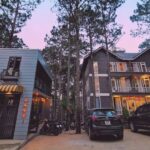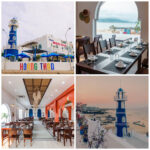Battle Of Dien Bien Phu
This article by the late Bernard B. Fall is an account of one of the most significant battles to take place in Vietnam. A conflict between Communist Viet Minh forces and a French-established garrison, it occurred in a town called ‘Seat of the Border County Prefecture or, in Vietnamese, Dien Bien Phu. Bernard Fall wrote that in comparison with other world battles, Dien Bien Phu could hardly qualify as a major battle, let alone a decisive one. Yet, he said, that is exactly what it was. The siege occurred while the 1954 Geneva Conference was ironing out agreements between the major powers, including the future of Indochina. When Viet Minh forces overran Dien Bien Phu on May 7, 1954, it was, according to Fall, the end of French military influence in Asia.
Đang xem: Cafe: ambassador cafe nearby dien bien phu in vietnam: 0 reviews, address, website
Fall was born in 1926 and grew up in France. Both his parents were killed by the Nazis in World War II. He gained firsthand guerrilla warfare experience while fighting in the French Underground from 1942 to 1944. With the Allied invasion of Europe, Fall joined the French army, serving in the infantry and pack artillery of the 4th Moroccan Mountain Division.
Following World War II, Fall worked as a research analyst at the Nuremberg War Crimes Tribunal. He first came to the United States in 1951 as a Fulbright Scholar, receiving his Master of Arts and Ph.D. in political science at Syracuse University. In 1953, in order to engage in field research for his doctoral dissertation, he traveled to war-torn Indochina. As a former French soldier he was allowed to accompany French forces on combat operations in all sectors of the country. In 1957 Fall joined the faculty of Howard University as professor of international relations, and he spent the summer of that year in South Vietnam. Awarded a grant from the Southeast Asia Treaty Organization (SEATO) for field study of Communist infiltration in Southeast Asia, Fall witnessed the outbreak of Communist hostilities in Laos. He spent the 1961-62 academic year in Cambodia on a Rockefeller Foundation grant. It was during that time that he succeeded in visiting Communist North Vietnam and interviewing Ho Chi Minh. In 1965 Fall again spent the summer with American and Vietnamese forces in South Vietnam.
 French paratroopers dash for cover as Viet Minh artillery resumes its punishment of the besieged base at Dien Bien Phu on March 23, 1954. |
Among his most important works are Street Without Joy, which became essential military reading about the war with no front lines, and Hell in a Very Small Place: The Siege of Dien Bien Phu. In the latter epic, Fall describes in extraordinary detail not only the failures but also the heroism that took place in what he calls one of the most decisive battles of the 20th century.
During his last trip to Vietnam in February 1967, Fall chose to accompany a platoon of the 1st Battalion, 9th Marine Regiment, on Operation Chinook II, a search-and-destroy mission. From Phu Bai the group moved along the area the French had named La Rue Sans Joie, or Street Without Joy. It was here, in the area that he had written about with much emotion, that Bernard Fall was killed by the explosion of a land mine, along with Gunnery Sergeant Byron Highland, a Marine combat photographer.
Bernard B. Fall will be remembered by history as one of the foremost authorities on the Vietnam War. He wrote this article in 1964, prior to the publication of Hell in a Very Small Place.
On May 7, 1954, the end of the battle for the jungle fortress of Dien Bien Phu marked the end of French military influence in Asia, just as the sieges of Port Arthur, Corregidor and Singapore had, to a certain extent, broken the spell of Russian, American and British hegemony in Asia.
The Asians, after centuries of subjugation, had beaten the white man at his own game. Today, 10 years after Dien Bien Phu, Viet Cong guerrillas in South Vietnam again challenge the West’s ability to withstand a potent combination of political and military pressure in a totally alien environment.
On that day in May 1954 it had become apparent by 10 a.m. that Dien Bien Phu’s position was hopeless. French artillery and mortars had been progressively silenced by murderously accurate Communist Viet Minh artillery fire, and the monsoon rains had slowed down supply drops to a trickle and transformed the French trenches and dugouts into bottomless quagmires. The surviving officers and men, many of whom had lived for 54 days on a steady diet of instant coffee and cigarettes, were in a catatonic state of exhaustion.
 French troops bring in wounded Viet Minh prisoners following another successful sally from the base on April 14, 1954. |
While their commander, Brig. Gen. Christian de la Croix de Castries, reported the situation over the radiotelephone to General René Cogny, his theater commander 220 miles away in Hanoi, in a high-pitched but curiously impersonal voice, the end obviously had come for the fortress. De Castries ticked off a long list of 800-man battalions, which had been reduced to companies of 80 men, and of companies that were reduced to the size of weak platoons. All he could hope for was to hold out until nightfall in order to give the surviving members of his command a chance to break out into the jungle under the cover of darkness, while he himself would stay with the more than 5,000 severely wounded (out of a total of 15,094 men inside the valley) and face the enemy.
Xem thêm: Gợi Ý Những Món Ăn Trưa Ngon Hà Nội, Ăn Trưa Ngon
By 3 p.m., however, it had become obvious that the fortress would not last until nightfall. Communist forces, in human-wave attacks, were swarming over the last remaining defenses. De Castries polled the surviving unit commanders within reach, and the consensus was that a breakout would only lead to a senseless piecemeal massacre in the jungle. The decision was made then to fight on to the end, as long as the ammunition lasted, and let individual units be overrun after destruction of their heavy weapons. This was approved by the French senior commander in Hanoi at about 5 p.m., but with the proviso that the men in Isabelle, the southernmost strongpoint closest to the jungle, and to friendly forces in Laos, should be given a chance to make a break for it.
Cogny’s last conversation with de Castries dealt with the problem of what to do with the wounded piled up under the incredible conditions in the various strongpoints and in the fortress’ central hospital — originally built to contain 42 wounded. There had been suggestions that an orderly surrender be arranged, to save the wounded the added anguish of falling into enemy hands as isolated individuals. But Cogny was adamant on that point: Mon vieux, of course you have to finish the whole thing now. But what you have done until now surely is magnificent. Don’t spoil it by hoisting the white flag. You are going to be submerged
All right, mon général, I only wanted to preserve the wounded.
Yes, I know. Well, do as best you can, leaving it to your
There was a silence. Then de Castries said his final words: Bien, mon général.
Well, good-bye, mon vieux, said Cogny. I’ll see you soon.
A few minutes later, de Castries’ radio operator methodically smashed his set with the butt of his Colt .45 pistol. Thus the last word to come out of the main fortress, as it was being overrun, came at 5:50 p.m. from the radio operator of the 31st Combat Engineer Battalion, using his code name: This is Yankee Metro. We’re blowing up everything around here. Au revoir.
Strongpoint Isabelle never had a chance. While the main defenses of Dien Bien Phu were being mopped up, strong Viet Minh forces already had tightened their grip around the 1,000 Legionnaires, Algerians and Frenchmen preparing their breakout. At 9:40 p.m., a French surveillance aircraft reported to Hanoi that it saw the strongpoint’s depots blowing up and that heavy artillery fire was visible close by. The breakout had been detected. At 1:50 a.m. on May 8, 1954, came the last message from the doomed garrison, relayed by the watchdog aircraft to Hanoi: Sortie failed — Stop — Can no longer communicate with you — Stop and end.
The great battle in the valley of Dien Bien Phu was over. Close to 10,000 captured troops were to begin the grim death march to the Viet Minh prison camps 300 miles to the east. Few would survive. About 2,000 lay dead all over the battlefield in graves left unmarked to this day. Only 73 made good their escape from the various shattered strongpoints to be rescued by the pro-French guerrilla units awaiting them in the Laotian jungle. Eight thousand miles away, in Geneva, the Vietnamese and Red Chinese delegations attending the nine-power conference that was supposed to settle both the Korean and the Indochinese conflicts toasted the event with pink Chinese champagne.
What had happened at Dien Bien Phu was simply that a momentous gamble had been attempted by the French high command and had backfired badly. The Indochina War, which had broken out in December 1946 after Ho Chi Minh’s Viet Minh forces felt that France would not agree to Vietnam’s eventual independence, had bogged down into a hopeless seesaw.
Xem thêm: Bánh Su Kem Savoure Bằng Ví Momo, Savouré Bakery
Until Red China’s victorious forces arrived on Vietnam’s borders in December 1949, there had been at least a small hope that the French-supported Vietnamese nationalist government, headed by ex-emperor Bao Dai, could wean away from the Communist-led Viet Minh the allegiance of much of Vietnam’s population. But with the existence of a Red Chinese sanctuary for the Viet Minh forces, that became militarily impossible. By October 1950, 23 regular Viet Minh battalions, equipped with excellent American artillery coming from Chinese Nationalist stocks left on the mainland, smashed the French defense lines along the Chinese border and inflicted on France its biggest colonial defeat since Montcalm died before Quebec in 1759. Within weeks, the French position in northern Vietnam had shrunk to a fortified perimeter around the Red River Delta, a continuous belt of Communist-held territory from the Chinese border to within 100 miles of Saigon. For all practical purposes the Indochina War was lost then and there.






Bình luận